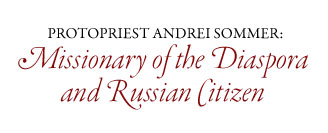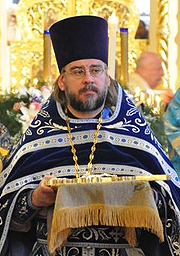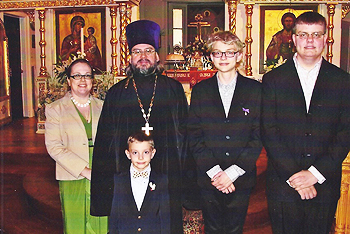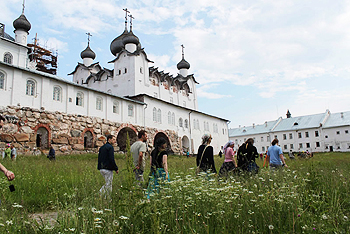
 The office of the Senior Priest of the Synodal Cathedral of Our Lady �of the Sign��in New York, Protopriest Andrei Sommer, is like a chronicle. It reminds me of an ecclesiastical-archeological museum on a miniature scale. Its exhibits, icons, decrees of blessing hanging on the walls, while the display cases are instructive about the history of recent decades of the life of the Russian diaspora in America. And if one studies these things more carefully, they will reveal remarkable and edifying stories about who came to the American continent �temporarily,� in hopes of a speedy return to their homeland. But Divine Providence kept them here more permanently. The office of the Senior Priest of the Synodal Cathedral of Our Lady �of the Sign��in New York, Protopriest Andrei Sommer, is like a chronicle. It reminds me of an ecclesiastical-archeological museum on a miniature scale. Its exhibits, icons, decrees of blessing hanging on the walls, while the display cases are instructive about the history of recent decades of the life of the Russian diaspora in America. And if one studies these things more carefully, they will reveal remarkable and edifying stories about who came to the American continent �temporarily,� in hopes of a speedy return to their homeland. But Divine Providence kept them here more permanently.
Right above Fr Andrei�s office is the Cathedral. At one time it was a ballroom. The Russians who settled here ignored their titles and ranks, took up hammer and paintbrush, established a church and began to pray. In fact, many of those who came to America from Europe or China after World War II, still overcome by the communist revolution, did not reveal to their children for many years the story of their ancestry. And so it was with the Sommer family.
Fr Andrei celebrated his first Liturgy at the �Synod��as the locals call the Synodal Cathedral dedicated to the Kursk-Root Icon of the Mother of God "of the Sign"�thirteen years ago. Now Fr Andrei�s office is not only an archive but the headquarters of a youth movement of the Russian diaspora: here ideas are born, plans and developed for various trips, pilgrimages, international youth forums. This ministry includes parishes on five continents with time differences of up to 14 hours.
The experience of youth ministry is laid out in a beautifully-illustrated book Fr Andrei published last year which outlines the history, forms and methods of work with young people in the Russian Orthodox Church Outside of Russia titled �From West to East.�
Chinese Russians in California
��Fr Andrei, the press has reported a lot about the joint projects of Russian youth in Russia and abroad, which expanded after the reconciliation of the two parts of the Russian Orthodox Church. The director of all these projects is always the same�Fr Andrei Sommer� Why don�t we fill in some blanks and talk about your personal path in the Church?
��I was born in San Francisco, baptized in the Cathedral of the Mother of God �Joy of All Who Sorrow,� where St John of Shanghai once served. My parents were married there�Vladimir Alexandrovich and Nadezhda Ivanovna. They were born in China and met in America in the 1950�s. They arrived in the US through South America: their sponsors in Brazil did not provide for them for very long, so they moved to California.
The various generations of our family have warm relations. The other day, my grandmother, Klavdia Ivanovna Sommer, celebrated her 101st birthday. Thank God, she still has energy and is active. She was born in China even before the Revolution in Russia, and was baptized within the Russian Ecclesiastical Mission. There she met my grandfather, whose forefathers were Germans of Saratov. He was an engineer, and was building a railroad in China.
My grandmother�s father on my mother�s side (my great-grandfather), was a priest in Siberia. I only found this out as an adult. It turned out that for over two hundred years, our family had four generations of clergymen. My great-grandfather only had three daughters, and so the string of Siberian priests of the Zatoplyaev family came to an end. Many years later, even after arriving in America, my grandparents feared revealing their heritage.
I grew up in a suburb of San Francisco, the town of Burlingame, CA. We lived around the corner from the Church of All Russian Saints, and attended every service. I remember how on the eve of my seventh birthday, right before the Elevation of the Holy Cross, one of the elder altar servers asked my parents to let me serve there, too. So at the age of seven I began to serve in the altar. The first priest I served under was the renowned Protopresbyter Nikolai Masich, who arrived in California from Hamburg after the war.
All Russian Saints Church was a branch of the Synod of Bishops of the Russian Orthodox Church Outside of Russia. During the hot and humid New York summer, Metropolitan Anastassy (Gribanovsky) often traveled to California. It was for the First Hierarch�s services that a chapel was first established in Burlingame, which later became a church. I never knew Metropolitan Anastassy, but I do remember Metropolitan Philaret (Voznesensky). He would come for our parish feast day and would bring the Kursk-Root Icon of the Mother of God for us to venerate. I remember holding the bishop�s staff and serving under him in the altar.
My service began in the Synodal �podvorie� there and many years later the Lord brought me to the Synod itself, in New York, where I now serve.
��Fr Andrei, the region around San Francisco, with all its �Russian-Chinese� immigrants, is still considered throughout America to be the most �Russian� area: there are parish schools, high schools, strong traditions�
��I attended the Burlingame parish school. Though it was called a �parish school,� it was really a general educational facility on the high-school level, where up to eighty students studied. Our teachers were professionals from the old emigration: teachers from the nobility, former professors from Tsarist Russia. They were all unpaid volunteers, donating their time to pass on their knowledge to the younger generation of Russian emigres.
Preserving the Russian Tongue
Upon graduation I also began to teach there while studying engineering in college. I worked as a draftsman and took university classes in the evening. Soon my desire to become a clergyman drew me to Holy Trinity Seminary in Jordanville, NY. It happened to be the 1000th anniversary of the Baptism of Russia. My spiritual father, Archbishop Anthony (Medvedev), gave me a recommendation, and expected that I would return to serve in his diocese in Western America.
With his blessing, the current Ruling Bishop of San Francisco and Western America, Archbishop Kyrill, ordained me as a deacon during my fifth year of seminary. A year earlier, I married my wife. Matushka Natalia is of an ancient clerical family. Her great-grandfather, the renowned theologian of the Russian diaspora, Protopresbyter Michael Pomazansky, taught for many years at Holy Trinity Seminary.
��Where did you meet your wife? Does she share your interest in youth ministry?
 ��We met in Burlingame, when she went to spend Pascha with her relatives: her aunt�s husband is the Rector of All Saints Church, Fr Stefan Pavlenko. We met on Palm Sunday, but afterwards she returned to New York. I enrolled in seminary and we wrote to each other a great deal, and visited each other, and a year before I graduated, we got married. ��We met in Burlingame, when she went to spend Pascha with her relatives: her aunt�s husband is the Rector of All Saints Church, Fr Stefan Pavlenko. We met on Palm Sunday, but afterwards she returned to New York. I enrolled in seminary and we wrote to each other a great deal, and visited each other, and a year before I graduated, we got married.
My wife is a college professor, she teaches electrical engineering, math and physics. The fact is that in the Church Abroad, a priest must often have a civil job to support his family. Sometimes both husband and wife have to work, sometimes the matushka works full time. And so my wife took this obedience upon herself, so that I could spend all my time on the church and missionary work.
We are rearing three children: Sebastian, our eldest, just finished his second year in college, our middle son, Gabriel, just graduated high school, and nine-year-old Philipp is in school. They have all served in the church, at home we try to maintain the Russian spirit, but they don�t speak Russian as well as our generation did, of course.
��Is your family or school responsible for your good Russian?
��In high school we studied all the subjects in Russian, and we spoke Russian at home. Now it may seem strange, but when I first started attending American school, I spoke no English. I felt like a foreigner! I had to endure a lot from my classmates.
Our children understand Russian now, some even read, but on the whole, the fourth generation of Russians abroad is losing its native language. Trips to Russia that we organize as part of the missionary work really help our young people preserve and perfect their Russian.
�There Are Really Orthodox Christians in America?��
��Fr Andrei, how did your work with youth begin?
��It was from my own participation in youth events. Archbishop Anthony appointed me to help organize an All-Diaspora Russian Youth Conference on the 1000th anniversary of the Baptism of Russia in San Francisco.
The year that St John of Shanghai was canonized, 1994, I was ordained to the priesthood and began to serve in my first parish in Chicago, where we organized the 9th All-Diaspora Youth Conference. In 2000, my family moved to New York, and I began to serve in the Cathedral of Our Lady �of the Sign.� As the signing of the Act of Canonical Communion approached, in 2006, I was appointed Vice President of the Synodal Youth Department of the Church Abroad (it president is now His Eminence Metropolitan Hilarion, First Hierarch of ROCOR).
My first project as VP and the first joint program with Russian youth was the All-Diaspora Pilgrimage called �In the Footsteps of Moses.��We went from Egypt to the Holy Land, and included 120 kids from various countries. Then we began to collaborate with Russian, Ukrainian and Belarussian youth: conferences, symposia, forums, meetings, all of which culminated with the 12th All-Diaspora Conference in Paris in 2011.
I counted up that since the signing of the Act, over one hundred young people from the parishes of the Church Abroad participated in projects and trips to Russia. Ninety percent of them visited Russia for the first time thanks to the Synodal Youth Department�s efforts.
The missionary trips to our historic homeland from various countries of the Russian diaspora are an important facet of our operation, because first of all they serve to strengthen faith. Orthodox Christians comprise only about one percent of all Americans, while in Russia, young people find communion with those of their faith like in no other nation. Young people come to realize that they are not �strange,� like they may in the USA.
��How fast do young people from abroad find common ground with their Russian counterparts?
��They make contact immediately upon arrival. Russians are interested in our way of life: they ask �Are there really Orthodox Christians in America?�
The only thing our youth have trouble with is when they hear: �The Americans are here.��Most of our kids were reared in the Russian Church Abroad, they speak Russian, they live with the Russian spirit and feel themselves to be Russian. They do call themselves zarubezhniki (�people from abroad�). We are not Americans, but maybe we�re not Russians either, so we�re just zarubezhniki. When we start to speak Russian, read an akathist, sing, Russian kids look at us and understand that we really live a Russian way of life.
Young people get to know each other during these joint programs, these trips, and after some time we hear that couples get married and start families. So a new generation is appearing to participate in our programs.
A Place of Power of the Spirit
��Fr Andrei, when did you come to Russia the first time?
 ��In 2001, when I was already serving in the Synodal cathedral�I went to buy books for our store. It was then that I sensed the holiness of Russia despite all the difficulties the country was experiencing at the time: it was a time of commercialization, and the rudeness I witnessed on the streets� ��In 2001, when I was already serving in the Synodal cathedral�I went to buy books for our store. It was then that I sensed the holiness of Russia despite all the difficulties the country was experiencing at the time: it was a time of commercialization, and the rudeness I witnessed on the streets�
One of the most memorable moments was my visit to Christ the Savior Cathedral. As a child I heard the story about how this church was razed to the ground. I saw with my own eyes the symbol which united Orthodox Christians, I felt the power of Holy Rus.
Later, as I traveled throughout Russia with the kids, I had the same palpable sensation, in Ekaterinburg, at Ganina Yama, in St Petersburg, in Kursk. Solovki left lasting impressions, where our young people helped restore the monastery. In Solovki you get the clear sense of the presence of both God and devil; you sense the struggle with all your being. Solovki reminded me of the images of the battle between Archangel Michael and the forces of evil. It was the ultimate battle of good versus evil. It is no accident that the Mother of God often revealed Herself on the islands of Solovki.
For me, Solovki, Ganina Yama, the relics of Ekaterinburg are the quintessence of the battle which continues to this day in Russia. One should absolutely visit these places in order to grasp the power and holiness of Russia. That is why we bring our young people from abroad to Russia. But all these projects can only take place with the help of benefactors.
Most of those who participate in this ministry are students (who often also have jobs), and cannot afford trips abroad. But it is very important for their spiritual education to reach them while they are in college. These trips can turn their lives completely around, because four years in college, where they receive lay educations, only prepare them for life in America. We have to reveal to them this place of power of the spirit, their historic homeland.
We plan to expose our youth not only to the renowned holy sites in the center of Russia and Ukraine, but to travel further east�to Yakutia, Vladivostok, Baikal and the Far East. These are places where Orthodoxy set down roots, where true missionaries live and work, just like those who brought the light of the Truth of Christ to America.
��Fr Andrei, you are American by birth, Russian in spirit and language. But few know that you are also a Russian citizen�
��Right after the reconciliation between the Russian Church in the Fatherland and the Church Abroad, six Synodal staff members, both clergy and laity, all of Russian descent, appealed to Sergei Viktorovich Garmonin, Russian Consul General in New York, with a request to grant us Russian citizenship. Our request was deliberated for a year, and in 2008 we all became citizens of Russia.
If you look into my Russian passport, you will see no fewer than forty stamps, received upon crossing international borders. Often I think about my first missionary effort in San Francisco twenty-five years ago and understand that our youth ministry is only beginning�
Tatiana Veselkina�
New York
pravmir.ru
|